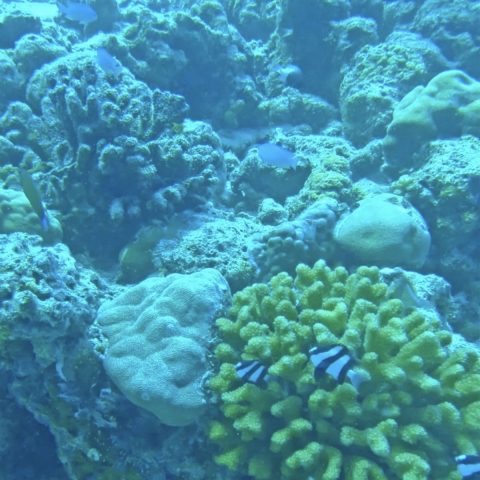Derbyshire eco business owners help planet by planting baby coral reef

Owners of an award-winning Derbyshire business making outdoor furniture from recycled plastic have gone global in their quest to help the environment by planting a baby coral reef in the Indian Ocean.
Rob and Anne Barlow, owners of TDP Ltd in Wirksworth – which has recently received the Royal seal of approval by being crowned with a Kings Award for Enterprise for Sustainability – travelled out to the UNESCO Baa Atoll Biosphere Reserve to help plant the baby reef.
They are passionate about championing the environment in their home lives as well as in their business, which has so far saved 4,300 tonnes of 100 per cent British plastic waste from going into landfill, rivers and oceans, preventing nearly 25million kilograms of CO2 from being released into the atmosphere.
As well as being business owners, the couple are committed ‘citizen scientists’, a continuation of a lifelong interest for Anne, whose degree was in Zoology. Their trip to the Indian Ocean involved Rob donning diving gear and joining marine biologist Oriana Migliaccio to gather coral which Anne then used to plant a new baby reef in a frame on the sea-bed.
In 2016, devastating bleaching affected 60 per cent of coral reefs in the area, and huge swathes are further threatened by rising sea temperatures – which have hit new records in 2023 – caused by climate change and El Niño.
Rob said: “Coral reefs are absolutely fascinating. They’re fragile but they regenerate brilliantly too. We dived to pick up coral which had broken off but still had some life in it. We literally captured bits of reef in a net and planted them in a special frame, measuring a metre squared.” As part of the project, frames were being established with the aim of creating a number of 20 metre reefs over the next few years as the coral grows.
He added: “It felt amazing to be making some difference and trying to find out more about how climate change is affecting the world. We’ve since heard that our little reef is doing very well, which is excellent news.”
Citizen science involves members of the public conducting scientific research, often involving trying to find solutions to the climate crisis. People get involved through gathering information to create data sets, and helping conduct experiments.
Rob and Anne are now committed citizen scientists, having previously travelled out to Antarctica where they joined 25 international scientists as part of the National Oceanic and Atmospheric Administration (NOAA), releasing weather balloons from a low carbon vessel to study winds and temperature at high altitude.
Scientists were also measuring the impact of microplastics on the environment – a cause dear to Rob and Anne and at the heart of their business.
Rob said while in the Indian Ocean he had seen first-hand the enormity of the plastic problem affecting today’s world. He said: “You do see individual plastic bottles floating past. I saw container ship and although many have cleaned up their act we did see evidence of plastic waste being discarded once a ship had passed out of sight of land. Locals say it’s quite a common sight. These commercial vessels aren’t the only ones doing that. Remote islands in the Indian Ocean have had hundreds of tonnes of plastic wash up on their shore lines”.
Now Rob and Anne are so committed to citizen science trips they are planning another to the west coast of Canada and Alaska later in the year, where they will be building on their work in Antarctica studying humpback whale migration patterns and the effects of sea warming on marine birds like the puffin, before visiting a rescue centre for orphaned bears and helping monitor their population. They’ll also visit the Columbia Glacier, one of the most rapidly changing in the world, and support scientists studying weather patterns in the Baring Sea.
TDP Ltd makes a wide range of furniture including dining tables, benches and planters. The environmental problems with plastic taking hundreds of years to break down make it the ideal material for outdoor furniture, since it is almost infinitely hard-wearing and requires no maintenance. You can find out more here: www.tdp.co.uk
